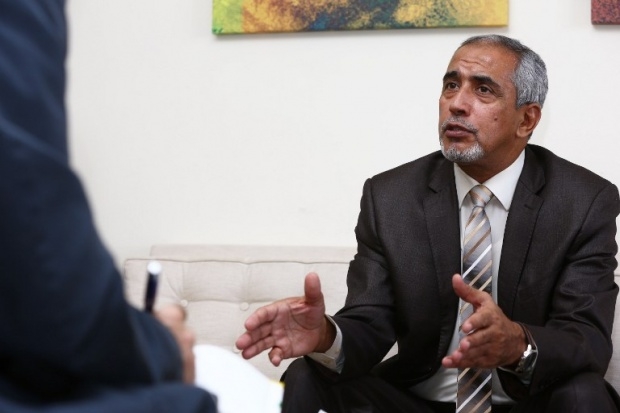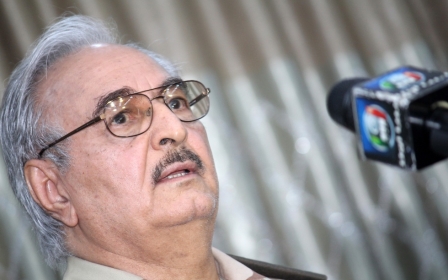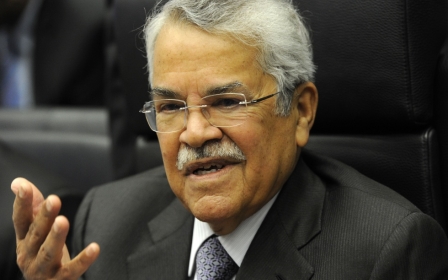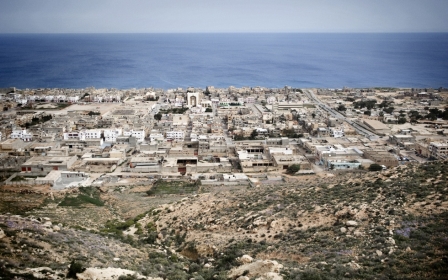GNC-linked company pays Canada-based lobbyist to 'influence' US policy on Libya

A controversial Canada-based lobbyist has been paid $2mn by a company linked to the Tripoli-based General National Congress (GNC) to “influence US policy toward governance in Libya”, documents filed in the US have revealed.
Ari Ben Menashe’s Montreal-based consultancy firm, Dickens & Madson, has filed a disclosure with the US Department of Justice listing Libyan construction company Anayurt as a client.
The Foreign Agents Registration Act (FARA) documents state Anayurt is “supervised by Libya’s GNC government in Tripoli” and has paid Menashe to lobby the US and other governments including Russia.
“[Dickens & Madson] will attempt to influence US policy toward governance in Libya including support for a Libyan government growing out of the GNC in Libya,” read the documents.
“Registrant [Dickens & Madson] will specifically attempt to address with policy makers the way forward in Libya in light of the Libya Supreme Court ruling that the House of Representatives sitting in Tobruk is unconstitutional.”
Libya is in the midst of a civil conflict, with rival governments, militias, tribes and cities battling for supremacy since the 2011 revolution ousted long-time leader Muammar Gaddafi.
The House of Representatives (HoR) appears to remain the internationally recognised parliament, despite recently being ruled unconstitutional by the Supreme Court, and is allied with the forces of Khalifa Haftar, a formerly rogue general now integrated into the national army, from its base in the eastern town of Tobruk.
The GNC, which was replaced by the HoR after June elections, reconvened in August after the Misratan Led Alliance (MLA) of Libya Dawn seized control of the capital Tripoli. It opposes the HoR and has appointed a “national salvation” government in the capital.
New legistlative body
Despite the FARA documents seeming to suggest that the GNC is lobbying the US to promote its own position, lobbyist Menashe told MEE this was “absolutely not correct”.
“Our clients are a group of people [Libyans] who want to bring everybody [from the GNC and HoR] together and start a new legislative body,” he said by phone from Montreal. “Some [of the clients] are people who were in the GNC and some are still in the GNC.”
“We’re bringing together people from all sides and stripes. Dialogue is taking place inside and outside Libya – we are trying to push it as quickly as we can. We have connections with quite a number of groups in Libya.”
Menashe refused to reveal the specific people behind the project. He said “there has been progress” in bringing all parties together and explained he has been lobbying the US because “you have to create a [legislative] body the Americans will agree to".
Iranian-born Menashe is a former member of Israeli military intelligence and has been involved in numerous international scandals – including the illicit sale of arms to Iran and an alleged plot by Zimbabwean politician Morgan Tsvangirai.
The FARA documents said construction company Anayurt is “a wholly owned subsidiary of the Libyan Investment and Development Company (LIDCO) in support of [the] Unified Libya Movement (ULM)".
Menashe did not reveal what the ULM is, or the identities of those involved, and the movement did not respond to requests for interview at the time of publication.
Who owns Anayurt?
LIDCO has been described as Libya’s largest construction firm and is owned by Abdelhamid Dabaiba, who, whilst providing support for the 2011 revolution, was sanctioned in 2013 for his previous involvement with the Gaddafi regime.
Analysts cast doubt on LIDCO’s ownership over Anayurt.
“In Libya, you have to be partnered with LIDCO to function,” said the International Crisis Group’s Claudia Gazzini. “That’s why it’s considered a subsidiary of LIDCO. From what I know, Anayurt is a Turkish company.”
Turkey’s Burak Construction lists Anayurt as under their ownership on its website, in a statement by its chairman Burak Maslilar.
Maslilar is a Turkish businessman and has won billions of dollars of business in Libya.
No one at Burak Construction responded to requests for interview at the time of publication.
Gazzini explained that GNC members “have no legal capacity” to pursue political goals that include reclaiming legislative authority in Libya and could be lobbying as an alternative approach.
“I think it’s difficult for them [GNC members], on an individual basis, to engage a lobbying firm so maybe a friend, partner of like-minded person’s company is involved here and facilitated this lobbying contract,” she said.
“Menashe, however, hasn’t been successful lobbying on Libyan issues in the past. On the basis of what he did for the federalists, he didn’t seem to have achieved much.”
Advancing Federalist cause
In January this year, FARA documents revealed Menashe’s Dickens & Madson firm had been paid $400,000 for a one year contract to help sell oil on behalf of Cyrenaica federalists in eastern Libya.
Ibrahim Jathran, a militia leader from Ajdabiya in eastern Libya, was one of the clients involved in that deal. He has used his position to further federalism demands in the east, including the implementation of an eight month blockade of several oil ports earlier this year that cost Libya billions of dollars in lost revenue.
Despite Menashe’s inability to win greater rights for Libya’s federalists, he remained confident of finding a solution to the current civil conflict racking the country.
He said his work has involved “speaking to everybody involved” in the conflict, including regional players.
“There are a number of people from different sides and governments involved,” he said. “Each side has a sponsor – lots of governments in the Middle East are involved [in Libya’s conflict].”
Both Libya Dawn and Haftar’s forces have received outside help.
Qatar and Turkey have provided support to Muslim Brotherhood-linked groups included in Libya Dawn. On the other side, Haftar admitted over the weekend that he has been sent arms by Egypt, Algeria, the UAE and Saudi Arabia.
The UAE has also, according to US officials who spoke to the New York Times in August, led air raids against Libya Dawn positions in Tripoli from bases out of Egypt – allegations both Abu Dhabi and Cairo have denied.
The UN Support Mission in Libya has made attempts to kick-start a national dialogue but have so far been unsuccessful in their efforts.
Middle East Eye propose une couverture et une analyse indépendantes et incomparables du Moyen-Orient, de l’Afrique du Nord et d’autres régions du monde. Pour en savoir plus sur la reprise de ce contenu et les frais qui s’appliquent, veuillez remplir ce formulaire [en anglais]. Pour en savoir plus sur MEE, cliquez ici [en anglais].




